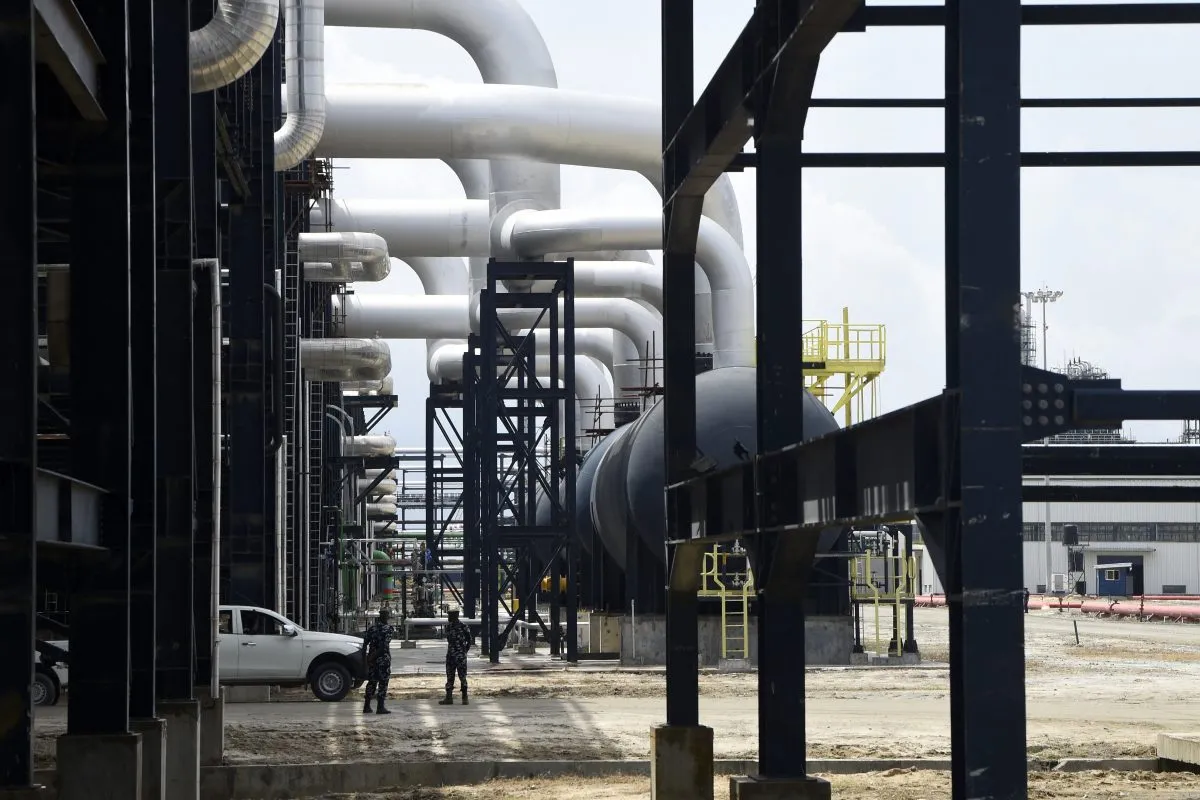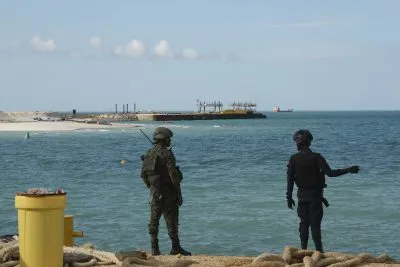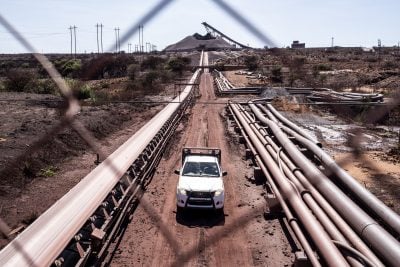It was a major milestone for Nigeria when trucks laden with gasoline rolled out of the premises of the newly minted Dangote Refinery, Lagos, on 15 September. It was the first time in more than a decade that a Nigerian refinery was supplying fuel to the local market. Indeed, for the first time in seven decades as a petroleum producer, Africa’s biggest oil exporter can now refine most of what it pumps. This is thanks to the 650,000 barrels per day capacity of the Dangote Refinery, owned by Africa’s richest man, Aliko Dangote.
This September, the refinery started producing gasoline, the fuel of choice for Nigerians that powers anything from cars to bikes to homes and offices. That took the daily output of the refinery, which started operations in January, to 500,000 barrels per day, on course to reach its full capacity of 650,000 barrels daily within a year.
The Dangote Refinery and other smaller private refineries currently have a combined installed capacity of about 740,000 barrels daily. Adding the installed capacity of 445,000 barrels per day at four state-owned refineries run by the Nigerian National Petroleum Company (NNPC) brings the total domestic refining capacity to almost 1.2m barrels daily. This should be welcome news as it offers Nigeria, a member of the Organization of the Petroleum Exporting Countries (OPEC), the opportunity to export more value-added products that bring better earnings.
Local currency
After initial difficulties in securing feedstock from oil companies operating in Nigeria, the government worked out an arrangement for the Dangote Refinery to get supplies of oil in the local currency. The refiner is equally obliged to price supplies to the domestic market in the same currency.
“Doing that will give a lot of stability to the naira and remove 40% of the demand for dollars” in the market for fuel imports, Dangote told reporters at a briefing at the sprawling complex in Lagos. “This refinery will actually change the entire dynamics [of fuel supply] not only in Nigeria but in sub-Saharan Africa… The capacity that we have will not only meet Nigeria’s demand, but it will also meet the demand of sub-Saharan Africa, at least.”
Other benefits that will come with local refining include being able to tell how much gasoline Nigerians actually consume, often cited as more than 60m litres daily. That is twice the projections of some industry experts, who take into account large volumes of fuel being smuggled from Nigeria into neighbouring countries where it is more expensive. Dangote also sees local refining ending fraudulent foreign exchange demand by speculators who prepare documentation required for fuel imports for the sole purpose of collecting foreign exchange without bringing in products.
The refinery appears poised to reshape the global flows of both crude oil and refined petroleum products. While receiving an average of 177,000 barrels per day locally since the start of the year, the Dangote Refinery also ordered multiple cargoes of West Texas Intermediate (WTI) crude from the US and some Brazilian grades, altering the flow of crude in the southern Atlantic region. Previously, Nigeria exported all its crude oil.
“The refinery has already affected crude flows, with dozens of Nigerian cargoes remaining in-country and US WTI Midland, a comparable light, sweet grade, being imported,” S&P Commodity Insights noted in a recent report. “The mega-refinery could therefore tighten the light, sweet crude market.”
Also at risk is the import of refined fuel from European refiners, which in 2023 amounted to 250,000 barrels per day equivalent of refined fuel, that cost Nigeria $10bn, according to Chijioke Nwaozuzu, a professor of petroleum economics at the university in Nigeria’s oil hub, Port Harcourt. “This represents a huge patronage for European refineries. Nigeria’s fuel importers also enjoy reasonable margins and claim subsidy payments in addition,” he said. “Therefore, both the European refiners and the importers would do everything possible to frustrate and sabotage local refining in Nigeria.”
Reduced enthusiasm
Indeed, there are signs that those who have benefited from the old system won’t give up so easily. Under former President Muhammadu Buhari, the Dangote Refinery was seen by the government as the panacea to the country’s fuel supply woes and at his urging the NNPC took a 20% stake. Tinubu didn’t show the same enthusiasm for the refinery, and the NNPC was probably taking his cue when it did not take up the rest of the stake allotted to it after paying for an initial 7.5%, citing a change in business strategy.
So, when in July Farouk Ahmed, head of the Nigerian Midstream and Downstream Petroleum Regulatory Authority, which overseas refineries, told reporters that Nigeria will continue with fuel imports despite having sufficient local refining capacity, many saw him as reading the government’s script. He said that, apart from the refinery not being fully licensed yet, it was producing substandard products. “We cannot rely on one refinery,” Ahmed said. “That is not good for the nation in terms of energy security, and it is not good for the market because of the monopoly.”
Those claims brought out the activist in Dangote. At a press conference in response, Dangote alleged that the NNPC and the regulators were sabotaging local refining because some of their officials owned fuel blending plants in Malta from where they brought substandard petroleum products into Nigeria. Mele Kyari, the group chief executive officer of the NNPC, denied the allegation, saying he didn’t personally own such a facility in Malta. Kyari later said on another occasion that some of what he knows about Nigeria’s oil industry can only be disclosed when he has left office.
It did little to end the perception that some influential forces in the Tinubu government didn’t want the Dangote Refinery. There has also been talk among Tinubu’s supporters about Dangote not showing enough support for the president during last year’s election campaigns. Former Vice President Atiku Abubakar, Tinubu’s challenger in last year’s election, accused the government of deliberately frustrating Dangote, a charge the president’s office denied.
Still, Dangote gave credit to Tinubu for providing the breakthrough that now requires the refinery to receive crude oil in naira and supply the refined products in the same currency. It reflects the pragmatism of both men that Dangote recognised Tinubu’s power as an incumbent, with the president in turn realising that stopping the refinery would have far-reaching negative political consequences.
NNPC officials remain ambivalent about the Dangote Refinery. For instance, they initially disowned a statement that the NNPC would be the sole buyer of fuel for the local market, which later became true. The state oil company is also hard pressed to say when its own refineries will resume production after repeated postponements. The Port Harcourt Refinery, which cost $1.5bn for repairs, was to have restarted in August, and then September. No new resumption date has been set.
It’s symbolic of the situation in the state oil firm, hobbled by the inefficiencies engendered by political interference. Poorly-maintained refineries that continuously drain maintenance budgets without yielding products is one of the symptoms, but not the only one.
Struggling output figures
Oil output has struggled in the last three years, averaging 1.2m barrels per day in the first eight months of this year, compared to an average of 2.5m barrels daily two decades ago. For long a victim of unrest and disruptions from restive communities that feel cheated out of their local resources, the industry has in addition in recent years faced industrial-scale theft blamed on well-placed industry and security actors.
Even what is left of Nigeria’s output is tied to debts owed to joint venture partners and other creditors. Consequently, refineries built to process Nigerian crude, including Dangote’s, couldn’t find enough supply.
“Dangote has shown up the failings of the NNPC by building that large-capacity refinery, something that [the NNPC] should have done,” said Nwaozuzu, the petroleum economist. The NNPC “is not finding it easy to accept that fact.”
Want to continue reading? Subscribe today.
You've read all your free articles for this month! Subscribe now to enjoy full access to our content.
Digital Monthly
£8.00 / month
Receive full unlimited access to our articles, opinions, podcasts and more.
Digital Yearly
£70.00 / year
Our best value offer - save £26 and gain access to all of our digital content for an entire year!

 Sign in with Google
Sign in with Google 



